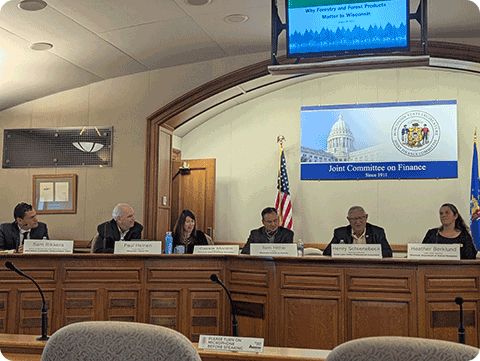
Highlights Wisconsin’s Forestry Industry’s Economic, Environmental, and Social Contributions
MADISON, WI. OCT. 19, 2025 – Gov. Tony Evers is proclaiming the week of Oct. 19-25 as Forest Products Week to highlight one of Wisconsin’s largest and most vital industries — the forest products industry — which directly employs more than 56,000 people and supports a total of 124,500 jobs when ripple effects across the economy are included, generates $1.5 billion in exports annually, and is the top employer in many rural counties, including Marathon, Price, Rusk, Taylor, and Trempealeau.
“Wisconsin’s forest products industry is a major economic driver in our state and supports countless jobs, which is why ensuring our forestry and forest products industry is supported and thrives continues to be a top priority for my administration,” said Gov. Evers. “Whether it’s in forest regeneration, helping support diversification, or expanding our vast forestry workforce, just as we have over the past six years, my administration and I will keep working to bolster Wisconsin’s forest products industry and protect our state’s ecosystems that are critical to our economic success.”

Sam Rikkers (left) moderates a panel of Wisconsin experts and leaders from a cross-section of the forest products industry.
During Forest Products Week, the Wisconsin Institute for Sustainable Technology (WIST), the Wisconsin Forestry Center (WFC), and LEAF–Wisconsin’s K-12 Forestry Education Program — all housed within the College of Natural Resources at the University of Wisconsin–Stevens Point — are joining forces with industry leaders, government partners, and community organizations to showcase the far-reaching value of Wisconsin’s forest products industry through tours, discussions and demonstrations.
“The forest products industry anchors local economies by providing skilled, high-paying jobs and supports a range of essential sectors such as transportation, packaging, and construction,” said Sam Rikkers, Deputy Secretary and COO of the Wisconsin Economic Development Corporation (WEDC), the state’s lead economic development agency. “The strength of Wisconsin’s forestry industry underscores its critical role in both economic stability and rural development.”
Wisconsin’s 17 million acres of forests are also integral to the state’s ecological resilience and cultural identity, offering a wide range of environmental and social benefits. They play a crucial role in providing cleaner air and water, safeguarding biodiversity, and supporting recreational tourism, particularly in rural communities where such industries contribute to local economies. Beyond their ecological value, these forests create opportunities for education, personal wellness, and meaningful community connection. The legacy of logging and forest management continues to shape Wisconsin’s economic and social landscape, underscoring the enduring importance of sustainable forest stewardship for future generations.
In recent years, the Evers Administration has prioritized strategic growth and sustainability in the forestry and forest products industry, with major recent investments including:
- $8 million in Wisconsin Workforce Innovation Grant funding from WEDC and the Department of Workforce Development (DWD) to support the Wisconsin Forestry Center at UW–Stevens Point in building a strong education-to-career pipeline in forestry, helping meet the growing demand for skilled workers. Part of this grant also funded Northcentral Technical College’s training sawmill.
- $5 million in federal CARES Act grant funding from the U.S. Economic Development Administration to Menominee Tribal Enterprises, allowing the Tribe to upgrade its current timber and sawmill processing capacity and create jobs for the community.
- $4 million for the Wisconsin Institute for Sustainable Technology at UW-Stevens Point. This Key Strategic Partner grant from the Wisconsin Economic Development Corporation (WEDC) is helping drive innovation in forest product development, particularly markets for underutilized pulp and fiber, sustainable packaging and tissue production.
- $1 million in funding from the DNR for Wisconsin Forests FIRST (Forest Industry Roadmap and Strategies for Tomorrow), which supports the development of a sustainable, diverse, and resilient forest products industry by assessing raw forest material supply and future access, exploring new global market opportunities, generating actionable strategies for sector development. This initiative was identified as a priority by the Governor’s Blue-Ribbon Commission on Rural Prosperity in its Rural Voices report.
For more information about Wisconsin’s forest products industry, visit the Forest Products Week website .
